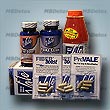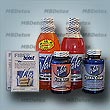-
October 7th, 2010
Drug Rehab In The Prison System
Related products:
-

Complete Critical Cleaning Package
In today’s job market, drug testing can be a mysterious intrusion. Pre-employment drug screens and random …
Buy now
$141.99 -

2 Month Extensive Cleansing Program (Extra Strong)
The Two Month Extra Strong Extensive Cleansing Program provides gradual permanent cleaning with two daily …
Buy now
$109.99 -

2 Month Extensive Cleansing Program (Regular)
The Two Month Extensive Cleansing Program provides gradual permanent cleaning with two daily supplements …
Buy now
$99.99
Drug Rehab in Prison system
Drug Rehabilitation is the scientific and professional process of trying to get drug addicts to quit the habit of consuming drugs. Drug use, also referred to as drug or substance abuse, is a serious problem with multiple dimensions viz. physical, psychological, financial, legal, social and the like. Drug use negatively affects the physical health by damaging the immune system, heart, lungs, brains and other vital organs. The same is done on the mental health. Apart from this drug users are prone to get violent and conduct robberies to purchase drugs. Drug traffickers also routinely employ violence against rival traffickers.
Drug Rehab is increasingly becoming a part of the criminal justice system. It is a crime to possess, use, purchase, sell or deal in narcotic substances. In USA authorities in the criminal justice system are taking an increasingly humane view of those drug users who are not a part of the organized narcotics system. Persons convicted of minor drug offences are being sent to rehab centers instead of being sent to prison. Also people caught in cases of drunken driving are made to attend Alcoholics Anonymous meetings. These meetings are conducted by an international institution of the same name with the objective of helping people stay sober and help alcoholics achieve sobriety.
In accordance with the provisions of the Violent Crime Control and Law Enforcement Act 1994, the Federal Bureau of Prisons (BOP) provides drug treatment to all those inmates who are eligible for it. This is not only a benevolent or philanthropic measure but also a necessary one. The ill effects of drug use and drug trade have already been mentioned. In addition to these, a huge amount of money is spent on correction facilities for the drug users. According to CASA estimate for the year 1996, $30 billion were spent on drug corrections of the total of $38 billion spent on all corrections. The types of programs operated by the BOP are: residential programs, transitional programs, non residential programs and drug education programs. The last two of these are not based on any unit. Residential programs are offered to those who are willing to stay on in units, separate from the rest of the society, for the duration of the treatment. Transitional programs are for those in a change over from custody to society.
-
No related posts.